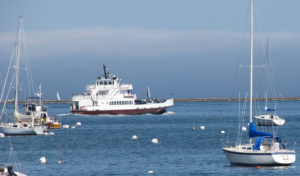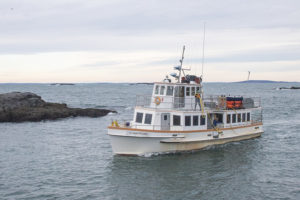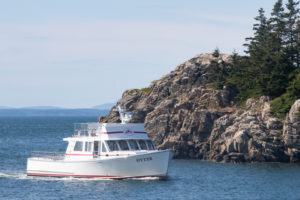
Whether you live on an island in one of the Great Lakes or off of the coast of Maine, the commute to and from your community is over water. No matter if it’s a short distance or a long one, this type of transportation comes with challenges: rough seas, visibility, and staffing, let alone making it to your boat or plane on time. Additionally, any changes made to island transportation, such as the availability or cost, sends ripples through many aspects of the communities who rely on this transportation service.
The pandemic exposed vulnerabilities in the coastal economy, island transportation among them. Thus in 2020, we hosted a series of convenings for transportation operators (both public and private) to hear their individual and shared needs. Operators found the meetings useful, so Island Institute staff committed to convening a quarterly ferry and air operators meeting. These meetings have built a shared network of operators, provided a space where the group could surface tight spots and solutions, and allowed the Island Institute to track trends that we might have the capacity to address either individually or systemically.
In early 2021, the Island Institute formalized its commitment to engage more fully on ferry issues as part of our strategic priorities for the next 10 years: Transportation providers to and from the islands are “too critical to fail,” in terms of maintaining the economic resilience of these communities. While we are still developing the long-term strategy to support critical island and coastal businesses, we are committed to partnering with Maine’s ferry and island transportation services as a part of this work.
The ferry, water taxi, and air services provide more than just transportation to and from island communities. Most importantly, they act as emergency medical transportation, but they also provide school and extracurricular transportation as well as delivery of USPS mail, UPS, FedEx, and other essential freight such as groceries and prescription drugs. Whether going to work, a medical appointment, the grocery store, or catching a plane, the ferry is a vital link in the journey.
“By their nature, island communities are beholden to the ferries that serve them, and the ferry schedule, timing, number of trips, and cost all have an impact on island life.” – Nick Battista, senior policy officer, Island Institute

Keeping transportation to and from island communities affordable is crucial to island residents and those who work on islands. Although some of Maine’s islands, such as Islesboro, may be associated with expensive homes or celebrity visitors, most year-round residents aren’t particularly wealthy. From census data collected in 2019, the median household income of Islesboro was $63,472, keeping Islesboro just under the average income for the country and slightly more than the average for both Maine and coastal communities. For a sense of the other communities who have a similar average income (+/- $2,500), Islesboro is just a little bit higher than Nobleboro and in line with East Machias and Trenton. And with the 2020 and 2021 housing stock price increases seen in Maine, notably in Knox County, cost of living continues to be an area of high concern especially for the coast’s workforce.
The linkages between the future of island communities and the transportation systems are numerous. This is not the first or last time the Island Institute will highlight the importance of this relationship. In a 2018 blog post, our Senior Policy Officer Nick Battista strongly stated, “Ferry service is not optional for island communities—they live or die by it.” Later that year, he expounded upon it saying, “By their nature, island communities are beholden to the ferries that serve them, and the ferry schedule, timing, number of trips, and cost all have an impact on island life.” You can read that full post here.

And I’m not one to disagree, as I’ve talked with both islanders and state officials who all recognize the critical service island transportation systems provide to our island communities. Of course, the complexity goes beyond just delivering a service to island residents and visitors. The economics need to make sense as well. Ferries typically run 25-30 years before the maintenance becomes too much and currently the Maine State Ferry System (MSFS) has a couple of vessels reaching that mark. Thus, as the State looks to contract the building of new vessels, they will also be locking into their operating budget 25-30 years of staffing and fuel costs to match the running of that vessel throughout its working years.
With the clear goals for CO2 emission reductions laid out in the Maine’s Climate Action Plan, it is an opportune time to look at the future of our ferries and other ocean faring vessels. This is the chance for Maine to be a frontrunner in lowering carbon emissions on the water and set the bar for other coastal areas. In part, our work at the Island Institute will focus on the blue economy and Maine’s opportunity to be a leader in this sector. Adapting propulsion technology that uses alternative fuel sources for Maine’s working fleet, including electricity from renewable sources, helps to reduce or control operational costs and makes good business sense. Our fleet of fishing vessels and our transportation systems to and from the islands are key pieces in the equation of lowering emissions and pollution to help the State meet its climate goals. New ferries are long-term investments in Maine’s future, and these investments must be made in a forward-looking manner.
Although we’re just off the starting line into this area of collaborative work on island transportation support, we know the time is right. We look forward to strengthening the existing partnerships that we’ve built with Maine’s ferry, water taxi, and air operators, and to building new ones in the months and years ahead.
Read more:
- This 2020 article in The Working Waterfront Newspaper documents some of the history of the Maine State Ferry Service and the close relationship the ferry service has had with island communities: “How we get here: A history of Maine’s ferry service”
- Check out “Providing Sustainable Transportation” in our Solutions Library to learn more about the various business models and opportunities provided by ferry and air services in and outside of Maine.
Questions?
For questions about this work, please contact the Island Institute’s Senior Policy Officer Nick Battista or Community Development Officer Lisa Millette.

